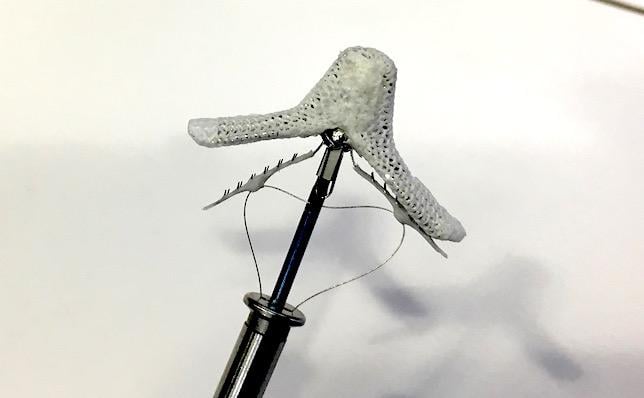
This is the latest version of the MitraClip, the G4, which allows each side of the clip to be opened and closed independently to offer more flexibility when capturing the valve leaflets. The device is being used in the REPAIR MR clinical trial.
January 13, 2020 — The U.S. Food and Drug Administration (FDA) has approved clinical trial that will compare the effectiveness of Abbott's minimally invasive MitraClip transcatheter mitral valve repair device to open heart mitral valve surgical repair in moderate risk surgical patients.
If successful, the trial may expand treatment options for patients who are suffering from primary mitral regurgitation (MR) whose current options are limited to open-heart surgery.
The MitraClip's current FDA indication is for high-risk surgical patients who have a leaking mitral valve. The device has been implanted in more than 100,000 patients worldwide. It is currently the only FDA cleared transcatheter mitral valve repair device.
The prospective, randomized REPAIR MR clinical trial will enroll about 500 patients at 60 sites in the U.S., Canada and Europe to evaluate the effectiveness of the MitraClip device in moderate surgical risk patients with severe primary MR who are candidates for open-heart surgery, which is the current standard of care. The trial's design addresses the issue that, despite symptoms and increased mortality for people suffering from MR, patients are often under treated by open-heart mitral valve surgery. Currently, only an estimated 15 percent of patients who are eligible for the standard-of-care surgery for their primary MR receive surgical treatment. In some cases, this may be because the MR goes undiagnosed, but in others, patients may forgo surgery due to prolonged recovery time or fear of possible surgical complications.[1,2]
"The REPAIR MR trial seeks to evaluate the MitraClip device in treating a new patient population who currently undergo the standard surgical treatment, but are at moderate surgical risk," said Patrick McCarthy, M.D., chief of cardiac surgery, Northwestern Medicine, executive director, Bluhm Cardiovascular Institute and co-principal investigator of the REPAIR MR trial. "This is an important question since approximately 70 percent of people diagnosed with primary mitral regurgitation aren't treated with open-heart mitral valve surgery today, yet are in need of treatment and symptom relief."
The trial will also be led by co-principal investigator Saibal Kar, M.D., director of structural heart disease and research, Los Robles Hospital and Medical Center.
Mitral regurgitation (MR) is a debilitating, progressive and life-threatening disease in which the heart's mitral valve does not close completely, causing blood to flow backward and leak into the atrium of the heart. The condition is the most common valve disease worldwide and can lead to reduced quality of life, recurrent hospitalizations and decreased survival.
Abbott's MitraClip system has been commercially available in the U.S. since 2013 and in Europe since 2008. The device has shown significant impact for patients with both primary and secondary MR who are at high risk for open-heart surgery. It has shown improved clinical outcomes and quality of life through a minimally invasive option that reduces MR's debilitating symptoms.
For more information on MitraClip: www.structuralheartsolutions.com
For U.S. safety information on MitraClip: www.structuralheartsolutions.com/us/mitraclip-isi
References:
1. Mirabel et al. European Heart Journal 2007;28(11):1358-1365; Dziadzko et al. Lancet 2018; 391:960-69
2. Hendrix, et al. Mitral Valve Repair Versus Replacement in Elderly With Degenerative Disease: Analysis of the STS Adult Cardiac Surgery Database. Annals of Thoracic Surgery 2019; 107:747-53. DOI: https://doi.org/10.1016/j.athoracsur.2018.09.018.


 January 05, 2026
January 05, 2026 









